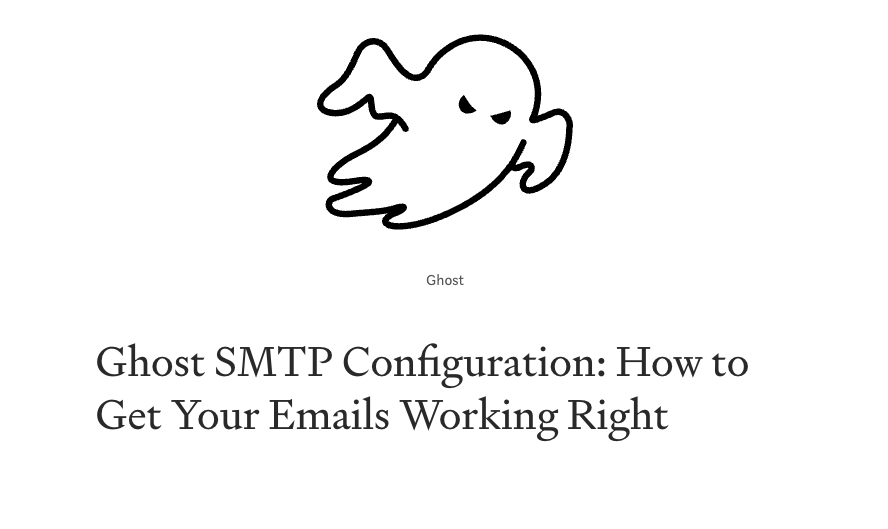Why Ghost Might Not Be the Best Option for Email Marketing
Table of Content
Ghost has gained popularity as a modern publishing platform with built-in newsletter capabilities, making it an attractive choice for creators who want an all-in-one solution.
However, when you dig deeper into Ghost as a self-hosted newsletter manager and CMS, you’ll notice some glaring limitations, especially for users serious about email marketing.
First Lets list Ghost newsletter features then, we will break down the challenges of using Ghost for newsletter marketing and why it may not fit everyone’s needs.
Ghost Newsletter and Email Marketing Features
- Built-in Newsletter Tool: Send newsletters directly from Ghost without plugins.
- Subscriber Management: Organize free and paid subscribers easily.
- Mailgun Integration: Reliable email delivery via Mailgun.
- Signup Forms: Add forms to grow your email list effortlessly.
- Paid Memberships: Monetize with premium newsletters and gated content.
- Welcome Emails: Automate greetings for new subscribers.
- Responsive Design: Emails look great on any device.
- Blog-to-Newsletter Sync: Publish posts and email them simultaneously.
- Open Rate Tracking: Monitor engagement with simple analytics.
- Custom Branding: Add your logo and colors to match your style.
- Privacy-Focused: No excessive tracking, just GDPR-compliant features.
What To Consider!
1. Limited Third-Party Email Support
Ghost only integrates with Mailgun for mass email delivery. While Mailgun is powerful, it’s not the most beginner-friendly option and often comes with steep pricing for large mailing lists.
Unlike other email marketing apps that support various providers like Amazon SES, Postmark, or even free SMTP setups, Ghost locks you into a single service.
For anyone on a budget or seeking flexibility, this is a major drawback.

2. Complicated Setup for Beginners
Self-hosting Ghost requires technical expertise. Setting up the platform, configuring Mailgun, and ensuring everything works smoothly often involves tinkering with server configurations, DNS records, and API keys.
This complexity can deter creators who just want to focus on growing their audience rather than wrestling with tech hurdles.
3. Lack of Automation and Advanced Features
Compared to dedicated email marketing apps like Mautic or Sendy, Ghost’s email marketing features are basic.
There’s no robust automation for drip campaigns, segmentation, or analytics. If you’re serious about newsletter marketing, these tools are essential to maximize engagement and track success.
Ghost itself relay on third-party services for automation and its built-in webhook features.

4. Resource-Intensive for Small Servers
Ghost is a Node.js application, which can be more resource-heavy compared to traditional CMS platforms like WordPress or Joomla. Hosting costs can quickly add up, especially when paired with Mailgun’s fees.
For small creators, this combination may feel like an unnecessary burden.
5. Limited Multilingual and Non-Newsletter Features
Ghost shines as a CMS for single-language sites with a focus on newsletters. However, it lacks built-in features for multilingual content, which can be a dealbreaker for businesses targeting global audiences.
If you want a robust platform to handle everything—blogging, newsletters, and more—other options might offer better flexibility.
Is Email Marketing Still Relevant?
The short answer is: it depends. Email marketing remains one of the most effective ways to reach and retain audiences, but it’s evolving. People expect personalized, automated, and visually engaging newsletters. Open-source email marketing apps like Mautic, Listmonk, and Postal provide such capabilities at a fraction of the cost.
At Medevel.com, we’ve covered several open-source email marketing systems that outshine Ghost in features and flexibility. These tools give you complete control over your campaigns without being tied to a single provider like Mailgun.


Should You Use Ghost for Email Marketing?
If you’re already using Ghost for content publishing and want a simple way to send newsletters, it might work for you.
But if you’re looking for a dedicated email marketing app with advanced features, better scalability, and more provider options, Ghost isn’t your best bet.
Ultimately, Ghost feels more like a publishing-first tool with a light newsletter marketing add-on. Serious marketers may find its limitations frustrating and costly in the long run.
If you’re exploring other options, consider open-source alternatives or services like Mailtrain or Mautic, which offer more flexibility without locking you into a single ecosystem.














